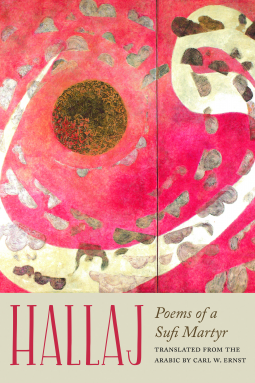
Hallaj
Poems of a Sufi Martyr
by Husayn ibn Mansur Hallaj; translated from the Arabic by Carl W. Ernst
This title was previously available on NetGalley and is now archived.
Send NetGalley books directly to your Kindle or Kindle app
1
To read on a Kindle or Kindle app, please add kindle@netgalley.com as an approved email address to receive files in your Amazon account. Click here for step-by-step instructions.
2
Also find your Kindle email address within your Amazon account, and enter it here.
Pub Date Jul 15 2018 | Archive Date May 24 2018
Talking about this book? Use #Hallaj #NetGalley. More hashtag tips!
Description
Winner of the Global Humanities Translation Prize
Hallaj is the first authoritative translation of the Arabic poetry of Husayn ibn Mansur al-Hallaj, an early Sufi mystic. Despite his execution in Baghdad in 922 and the subsequent suppression of his work, Hallaj left an enduring literary and spiritual legacy that continues to inspire readers around the world. In Hallaj, Carl W. Ernst offers a definitive collection of 117 of Hallaj’s poems expertly translated for contemporary readers interested in Middle Eastern and Sufi poetry and spirituality.
Ernst’s fresh and direct translations reveal Hallaj’s wide range of themes and genres, from courtly love poems to metaphysical reflections on union with God. In a fascinating introduction, Ernst traces Hallaj’s dramatic story within classical Islamic civilization and early Arabic Sufi poetry. Setting himself apart by revealing Sufi secrets to the world, Hallaj was both celebrated and condemned for declaring: “I am the Truth.”
Expressing lyrics and ideas still heard in popular songs, the works of Hallaj remain vital and fresh even a thousand years after their composition. They reveal him as a master of spiritual poetry centuries before Rumi, who regarded Hallaj as a model. This unique collection makes it possible to appreciate the poems on their own, as part of the tragic legend of Hallaj, and as a formidable legacy of Middle Eastern culture.
The Global Humanities Translation Prize is awarded annually to a previously unpublished translation that strikes the delicate balance between scholarly rigor, aesthetic grace, and general readability, as judged by a rotating committee of Northwestern faculty, distinguished international scholars, writers, and public intellectuals. The Prize is organized by the Global Humanities Initiative, which is jointly supported by Northwestern University’s Buffett Institute for Global Studies and Kaplan Institute for the Humanities.
Advance Praise
“'Before Rumi there was Hallaj.' Carl Ernst makes this astute observation is his Hallaj: Poems of a Sufi Martyr, to date the most thorough study in English of the verse of al-Husayn ibn Mansur al-Hallaj, a seminal figure of Islamic mysticism. Ernst provides a rigorous introduction to the writings of Hallaj, followed by carefully crafted translations based on his insightful readings of over a hundred poems ascribed to this early Sufi poet." —Th. Emil Homerin, author of Principles of Sufism
“This translation of al-Hallaj's poetry by a specialist in Sufism comes at the right time. With the increasing interest in Sufism, al-Hallaj's poetry responds to many queries with respect to Sufism, its itineraries, idioms, and basic conceptualizations that lay the ground for later scholarship. Carl Ernst mobilized his devotion, tact, and artistry to convey sense and sound of the poetry of a great Sufi master.” —Muhsin al-Musawi, author of The Medieval Islamic Republic of Letters
Available Editions
| EDITION | Paperback |
| ISBN | 9780810137356 |
| PRICE | $18.95 (USD) |
| PAGES | 216 |
Featured Reviews
 Reviewer 68310
Reviewer 68310
This is an excellent edition of Hallaj's iconic poetry. There're several informative and thorough essays on the background of Hallaj's life and legacy. The poems are organized on their symbolic themes which makes this a good reference. Each poem itself has an intro that offers an interpretation of it which illuminates the meanings of the poems themselves. This is probably best for someone with some familiarity with Sufi literature, will be invaluable for students really delving into the art, but is also a nice way for a complete beginner to gain some familiarity with Arabic poetry styles and Sufi belief systems.



